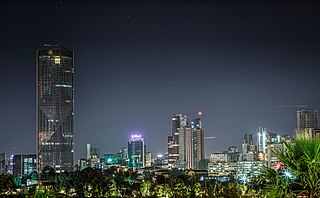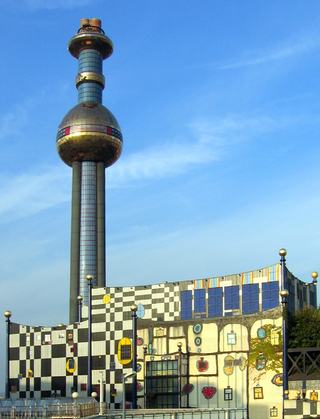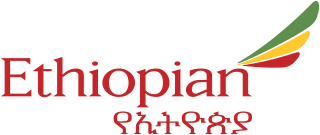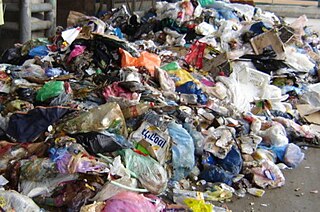
The economy of Ethiopia is a mixed and transition economy with a large public sector. The government of Ethiopia is in the process of privatizing many of the state-owned businesses and moving toward a market economy. The banking, telecommunication and transportation sectors of the economy are dominated by government-owned companies.

Addis Ababa is the capital and largest city of Ethiopia. In the 2007 census, the city's population was estimated to be 2,739,551 inhabitants. Addis Ababa is a highly developed and important cultural, artistic, financial and administrative center of Ethiopia. It is widely known as one of Africa's major capitals.

Biogas is a gaseous renewable energy source produced from raw materials such as agricultural waste, manure, municipal waste, plant material, sewage, green waste, wastewater, and food waste. Biogas is produced by anaerobic digestion with anaerobic organisms or methanogens inside an anaerobic digester, biodigester or a bioreactor. The gas composition is primarily methane and carbon dioxide and may have small amounts of hydrogen sulfide, moisture and siloxanes. The methane can be combusted or oxidized with oxygen. This energy release allows biogas to be used as a fuel; it can be used in fuel cells and for heating purpose, such as in cooking. It can also be used in a gas engine to convert the energy in the gas into electricity and heat.

Waste management or waste disposal includes the processes and actions required to manage waste from its inception to its final disposal. This includes the collection, transport, treatment, and disposal of waste, together with monitoring and regulation of the waste management process and waste-related laws, technologies, and economic mechanisms.

Incineration is a waste treatment process that involves the combustion of substances contained in waste materials. Industrial plants for waste incineration are commonly referred to as waste-to-energy facilities. Incineration and other high-temperature waste treatment systems are described as "thermal treatment". Incineration of waste materials converts the waste into ash, flue gas and heat. The ash is mostly formed by the inorganic constituents of the waste and may take the form of solid lumps or particulates carried by the flue gas. The flue gases must be cleaned of gaseous and particulate pollutants before they are dispersed into the atmosphere. In some cases, the heat that is generated by incineration can be used to generate electric power.

Ethiopian Airlines, formerly Ethiopian Air Lines (EAL), is the flag carrier of Ethiopia, and is wholly owned by the country's government. EAL was founded on 21 December 1945 and commenced operations on 8 April 1946, expanding to international flights in 1951. The firm became a share company in 1965 and changed its name from Ethiopian Air Lines to Ethiopian Airlines.
Eastman Chemical Company is an American company primarily involved in the chemical industry. Once a subsidiary of Kodak, today it is an independent global specialty materials company that produces a broad range of advanced materials, chemicals and fibers for everyday purposes. Founded in 1920 and based in Kingsport, Tennessee, the company operates 36 manufacturing sites worldwide and employs approximately 14,000 people.

Addis Ababa Bole International Airport is an international airport in Addis Ababa, Ethiopia. It is in the Bole district, 6 km (3.7 mi) southeast of the city centre and 65 km (40 mi) north of Bishoftu. The airport was formerly known as Haile Selassie I International Airport. It is the main hub of Ethiopian Airlines, the national airline that serves destinations in Ethiopia and throughout the African continent, as well as connections to Asia, Europe, North America and South America. The airport is also the base of the Ethiopian Aviation Academy. As of June 2018, nearly 380 flights per day were using the airport.

Municipal solid waste (MSW), commonly known as trash or garbage in the United States and rubbish in Britain, is a waste type consisting of everyday items that are discarded by the public. "Garbage" can also refer specifically to food waste, as in a garbage disposal; the two are sometimes collected separately. In the European Union, the semantic definition is 'mixed municipal waste,' given waste code 20 03 01 in the European Waste Catalog. Although the waste may originate from a number of sources that has nothing to do with a municipality, the traditional role of municipalities in collecting and managing these kinds of waste have produced the particular etymology 'municipal.'

Waste-to-energy (WtE) or energy-from-waste (EfW) refers to a series of processes designed to convert waste materials into usable forms of energy, typically electricity or heat. As a form of energy recovery, WtE plays a crucial role in both waste management and sustainable energy production by reducing the volume of waste in landfills and providing an alternative energy source.

Waste are unwanted or unusable materials. Waste is any substance discarded after primary use, or is worthless, defective and of no use. A by-product, by contrast is a joint product of relatively minor economic value. A waste product may become a by-product, joint product or resource through an invention that raises a waste product's value above zero.

An ash pond, also called a coal ash basin or surface impoundment, is an engineered structure used at coal-fired power stations for the disposal of two types of coal combustion products: bottom ash and fly ash. The pond is used as a landfill to prevent the release of ash into the atmosphere. Although the use of ash ponds in combination with air pollution controls decreases the amount of airborne pollutants, the structures pose serious health risks for the surrounding environment.
Plasma gasification is in commercial use as a waste-to-energy system that converts municipal solid waste, tires, hazardous waste, and sewage sludge into synthesis gas (syngas) containing hydrogen and carbon monoxide that can be used to generate power. Municipal-scale waste disposal plasma arc facilities have been in operation in Japan and China since 2002. No commercial implementations in Europe and North America have succeeded so far. The technology is characterized by the potential of very high level of destruction of the incoming waste, but low or negative net energy production and high operational costs.
The following is a historical events of Addis Ababa, the capital of Ethiopia, including its formation prior to 20th century by chronology.
Mohammed International Development Research and Organization Companies (MIDROC) is an Ethiopian mining and oil company owned by Ethiopian-born Saudi billionaire Sheikh Mohammed Hussein Al Amoudi. It has operations in Europe, the Middle East, and Africa. Through its Corral Petroleum Holdings AB, MIDROC has become a major independent oil company.
Qoshee also known as Koshe is a large open landfill which receives rubbish and waste from Addis Ababa, the capital of Ethiopia. The name means "dirty" in Amharic.
Beautifying Sheger is a project sponsored by the Ethiopian government that aims to clean rivers and create public works in the capital city, Addis Ababa. It was launched on 27 February 2019 under Prime Minister Abiy Ahmed, and aims to run for three years.

New York City's waste management system is a refuse removal system primarily run by the New York City Department of Sanitation (DSNY). The department maintains the waste collection infrastructure and hires public and private contractors who remove the city's waste. For the city's population of more than eight million, The DSNY collects approximately eleven thousand tons a day of garbage, including compostable material and recycling.

Crime in Ethiopia includes various techniques ranging from petty theft to homicide. Motivations of crime include high unemployment rate, lack of basic needs of life, housing and education. Rapid population growth also contributed to increase the criminal rate in Ethiopia. In Addis Ababa, crimes include robbery, pickpocketing, scamming and burglary among others are common, although the lowest rate compared to other African cities and within the country.















